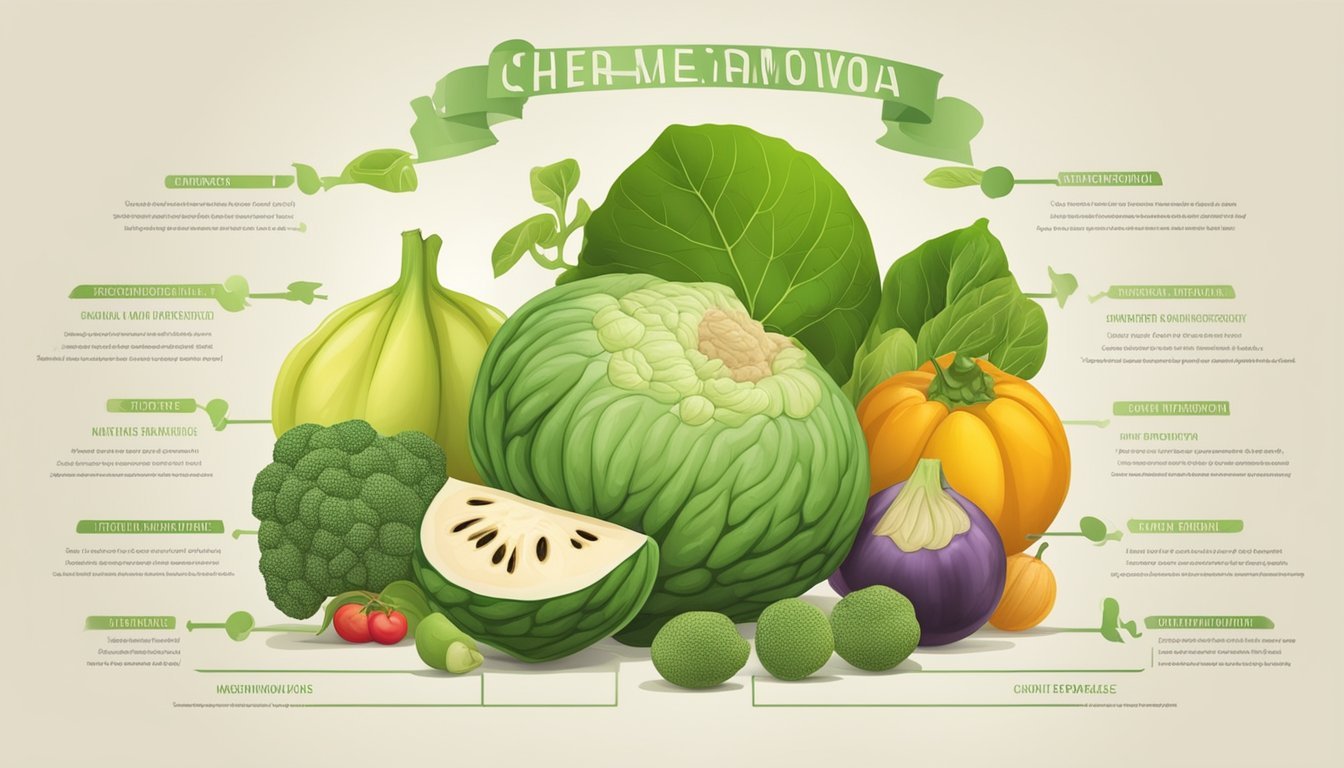What are the Health Benefits of Cherimoya?
Unveiling Nutritional Rewards
Cherimoya, also known as custard apple, is a tropical fruit (What wine goes well with fruit?) hailing from the high altitude regions of South America. The scientific name for this fruit is Annona cherimola. With its unique flavor and creamy texture, it has garnered attention not only for its taste but also for its numerous health benefits. Rich in vitamins, minerals, and antioxidants, cherimoya is becoming a popular choice among health-conscious individuals.
This fruit's health benefits are far-reaching, primarily due to its high antioxidant content. Antioxidants are compounds that help neutralize harmful free radicals in the body, potentially reducing oxidative stress and lowering the risk of chronic diseases. Cherimoya contains several key nutrients, including vitamin C, potassium, and magnesium, which collectively support immune function, maintain healthy blood pressure, and contribute to bone health.
In addition to essential nutrients, cherimoya is a good source of dietary fiber, which is beneficial for digestive health. Fiber aids in maintaining regular bowel movements and can help prevent constipation. Moreover, the vitamins and minerals found in cherimoya have been linked to improved cardiovascular health and may have cognitive benefits. All these factors make cherimoya not just a delightful fruit to include in the diet but also a potent ally for overall well-being.
Nutritional Profile of Cherimoya
Cherimoya, a sweet tropical fruit, is impressive for its rich content of vitamins, minerals, and other essential nutrients that contribute to overall health.
Vitamins and Minerals
Cherimoya is an excellent source of vitamin C, which is vital for immune system function and skin health. This fruit also provides a good supply of B vitamins, including niacin (B3), thiamin (B1), riboflavin (B2), folate, pantothenic acid, and vitamin B6, which are crucial for energy metabolism and neurological function. Cherimoya contains an array of minerals, including significant levels of potassium and magnesium, which help maintain heart health and blood pressure. It also offers copper, manganese, iron, phosphorus, and zinc, which support various body functions ranging from red blood cell production to bone health.
Macronutrients and Fiber
In terms of macronutrients, cherimoya provides a balance of carbohydrates and fiber with relatively low amounts of protein and fat. A notable macronutrient in cherimoya is its fiber content, which supports digestive health and can aid in maintaining a healthy weight by promoting satiety. Cherimoya's carbohydrates are primarily in the form of natural sugars, which provide quick energy. The fat present is minimal, making it a low-fat addition to a balanced diet.
Health Benefits of Cherimoya
Cherimoya, a tropical fruit, has gained attention for its wide array of health benefits, particularly in the realms of cardiovascular wellness, cancer prevention, digestive health, and immune system support. Each of these areas highlights the impact of cherimoya's nutrient composition on human health.
Cardiovascular Well-Being
Cherimoya is rich in potassium and magnesium, minerals that are essential for maintaining a healthy blood pressure. Consuming foods like cherimoya, which are high in these nutrients, may help prevent hypertension, a key risk factor for heart disease. The fruit's low sodium content also supports blood vessel function and can contribute to heart health.
Cancer Prevention Potential
The presence of powerful antioxidants like flavonoids, epicatechin, and epigallocatechin in cherimoya plays a crucial role in fighting against oxidative stress and chronic inflammation, which are linked to cancer development. Additionally, these compounds may combat free radicals to help reduce the risk of cancer.
Digestive Health Enhancement
Cherimoya contains dietary fiber, which is beneficial for digestion. Adequate fiber intake helps maintain regular bowel movements and might lower the incidence of digestive disorders. Fiber can also play a role in maintaining healthy cholesterol levels, further supporting digestion and cardiovascular health.
Support for the Immune System
Vitamin C, a potent immune system booster, is abundant in cherimoya. This essential vitamin fosters immunity by encouraging the production of white blood cells, which are vital for combating infections. The anti-inflammatory properties of vitamin C may also aid in reducing the severity of inflammatory conditions.
Incorporating Cherimoya into Your Diet
Cherimoya, with its creamy texture and unique blend of sweet and tart flavors, makes a versatile addition to various dishes. Knowing when the fruit is ripe and how to prepare it can enhance any meal experience with both taste and nutritional value.
Culinary Uses
Cherimoya's soft and scoopable pulp makes it a delightful ingredient for numerous culinary applications. Here are some specific ways to use this fruit:
Smoothies: Blend cherimoya pulp with other fruits (What wine goes well with fruits?) for a refreshing and fiber-rich drink.
Salads: Incorporate ripe cherimoya cubes into salads for a pop of creamy sweetness.
Desserts: Cherimoya can be the star of a pie or mixed with other ingredients to create exotic dessert flavors.
Preparation and Consumption Tips
When incorporating cherimoya into a diet, one must consider the best ways to prepare and consume the fruit. Here are some specific tips:
Identifying Ripe Cherimoya: Look for fruit that is slightly soft to the touch with a pleasant aroma. Ripe cherimoya should yield to gentle pressure, indicating it's ready to eat.
How to Eat: Cut the fruit in half and scoop out the creamy pulp, avoiding the large black seeds. The skin is not edible.
Storage: Unripe cherimoya can be left at room temperature until it ripens. Once ripe, it should be refrigerated and consumed within a few days for optimal taste and nutritional benefits.
Safety and Dietary Considerations
When enjoying the health benefits of cherimoya, it's important to be aware of the safety and dietary considerations related to its consumption. This section discusses the potential toxicity of cherimoya seeds and the possibility of allergies or interactions associated with the fruit.
Toxicity of Seeds
Cherimoya seeds contain toxic compounds that can be harmful if ingested. Specifically, they contain annonacin, a neurotoxin that has been linked to neurodegenerative diseases such as Parkinson’s disease, particularly when consumed in large quantities. It is crucial to remove and discard the seeds of the cherimoya before eating the fruit to avoid potential health risks. The closely related fruits, like soursop (also part of the Annona genus), also contain these compounds, and similar precautions should be taken.
Allergies and Interactions
Although cherimoya is a nutritious tropical fruit, individuals should be mindful of potential allergies and interactions. The proteins in cherimoya can cause allergic reactions in some people, presenting symptoms similar to those seen in allergies to other tropical fruits such as bananas and avocados. People with a known sensitivity to latex or other tropical fruits should exercise caution. Furthermore, cherimoya can interact with certain medications, such as those for high blood pressure or depression, due to its kaurenoic acid content. Individuals taking these types of medications are advised to consult with healthcare professionals before consuming cherimoya.
Frequently Asked Questions
This section answers common queries about the health benefits of cherimoya and how it can be incorporated into a diet for specific health advantages.
What nutritional benefits does cherimoya offer to those managing diabetes?
Cherimoya contains a low glycemic index and is high in dietary fiber, which may help in regulating blood sugar levels, making it beneficial for individuals managing diabetes.
How can consuming cherimoya impact skin health?
The high vitamin C content in cherimoya assists in collagen production, which aids in maintaining skin elasticity and may contribute to healthier skin.
In what ways can the leaves of cherimoya be used for medicinal purposes?
Cherimoya leaves are used in traditional medicine to make teas and extracts. They may possess anti-inflammatory properties and are sometimes used to help alleviate pain.
Are there any known adverse effects associated with eating cherimoya?
Consuming the seeds and skin of cherimoya can be harmful as they contain toxic compounds. The flesh of the fruit, when eaten in moderation, is generally safe for most individuals.
How does the nutrient composition of cherimoya classify it as a superfood?
Cherimoya is rich in vitamins C and B6, fiber, and several important minerals. Its high antioxidant content and diverse range of nutrients may support its classification as a superfood.
Can cherimoya seeds be used to enhance health, and if so, how?
Cherimoya seeds are not safe for consumption as they contain toxic substances. They must be discarded and not used to enhance health.





